Lily James' The Pursuit of Love review
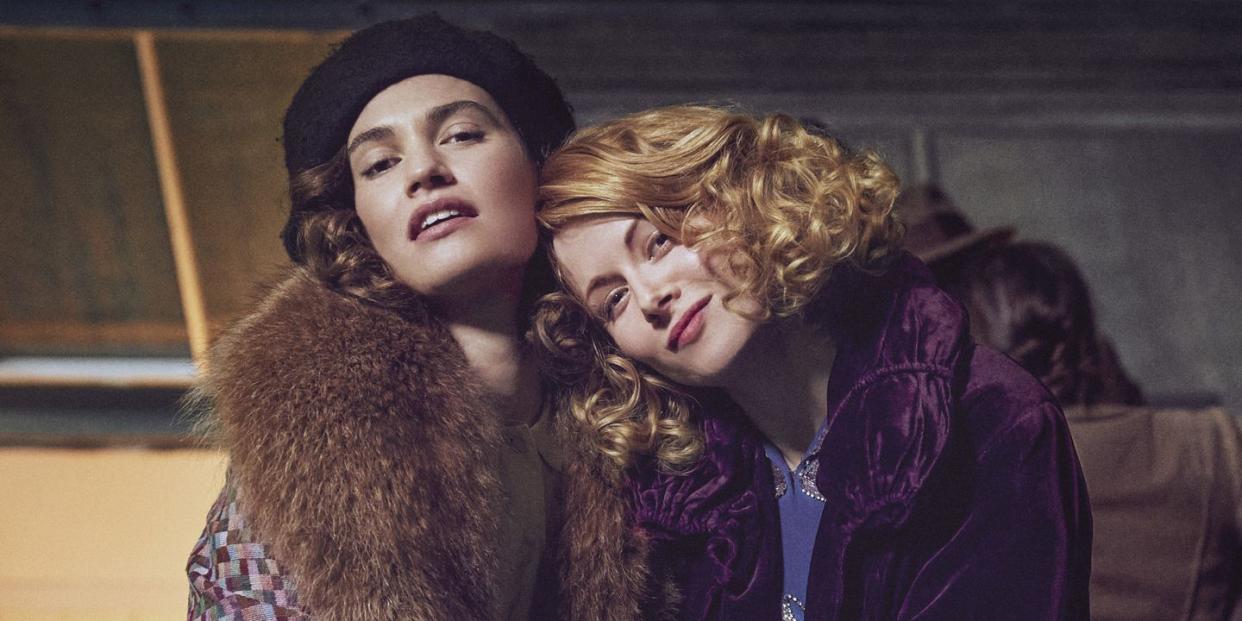
- Oops!Something went wrong.Please try again later.
Only episode one of three was made available for review.
"Love isn't silly," vocalises a visibly perturbed Linda (Lily James), baffled that anyone would ever think such a ghastly thought. "It's my religion!" she asserts with gusto, the existence of such a question an affront to her very being.
It saturates her every waking moment in The Pursuit of Love, a new three-part BBC drama adapted from Nancy Mitford's novel of the same name. Linda's unbridled defence of and commitment to full-blown romance in its headiest form is the lifeblood of this narrative, sustaining you on its currents from start to finish.
Then there's her cousin and best friend Fanny (Emily Beecham), the narrator of the piece who, if we were to think of the duo as two parts of the same whole, is like the left hemisphere of the brain: more methodical and measured in her thinking. She tries to sprinkle a little realism into Linda's endless daydreaming, however futile such an endeavour may be.
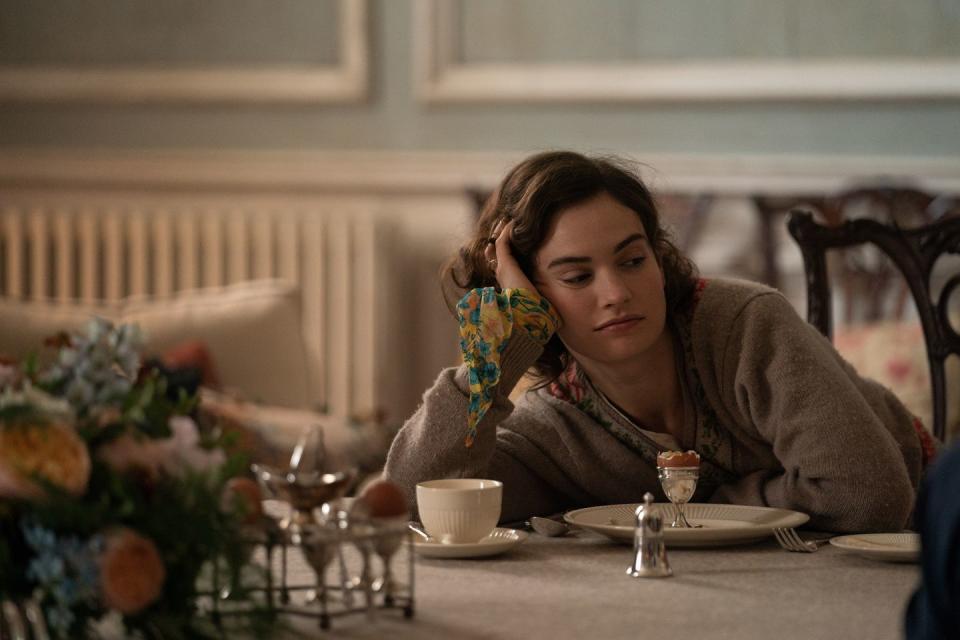
Their perspectives on love differ wildly.
"Is life only about love?" questions Fanny, wearily.
"YES!" yells Linda, before chucking her book out the window.
Fanny's unwillingness to throw herself into the pursuit of love as Linda does undoubtedly stems from her unsettled childhood. She was thrust into the hands of her aunt when she was just a baby after her mother left her husband for another man. That relationship fizzled out and she returned, only to pack her bags once again before departing with a new suitor. Throughout the course of Fanny's childhood, she would see her mother come and go on so many occasions that she was subsequently nicknamed "The Bolter".
Her reticence to subscribe without reservation to chasing romance for fear of the heartbreak she believes is an inevitability offers up a compelling question: who, indeed, is the foolish one? Is it Linda, who latches onto any hint of flirtation and blindly follows it wherever it may take her? Or Fanny, who retains a distance to protect herself from potential sorrow or disappointment?
Crucially, their divergent characters give the drama an equilibrium that it simply wouldn't have had if they were remotely similar in their outlooks and behaviours. Linda is a woman of extreme passion. Her emotions burn so brightly that without Fanny's presence to temper that, it would surely bubble over into utter pandemonium.

Their friendship is a lifeline for both of them as they come of age within society and muddle their way into adulthood. It's also an utter joy to watch, imbued with love and playfulness and admiration.
The intimacy that exists between them isn't an attempt by adaptor and director Emily Mortimer, who plays Fanny's mother, to queerbait the audience – a road that several films and pieces of television have unfortunately travelled down. In another pair of hands, with different performers, it could have fallen into that trap, which is a credit to the calibre of the talent in front of and behind the camera.
When Fanny stays with Linda and her family at Alconleigh, the pair sleep beside one another and will often sink into each other's embrace. As Fanny hauls herself out of the bathtub, Linda absentmindedly casts her clothes on the floor and climbs in herself. After a brief dip, they lie side by side on the floor, wrapped in their towels, cackling and joshing, their companionship the safest place in the whole wide world.
It's female kinship in all its glory, and in spite of Linda's hunt for The One, the series' great love story is their sisterhood.
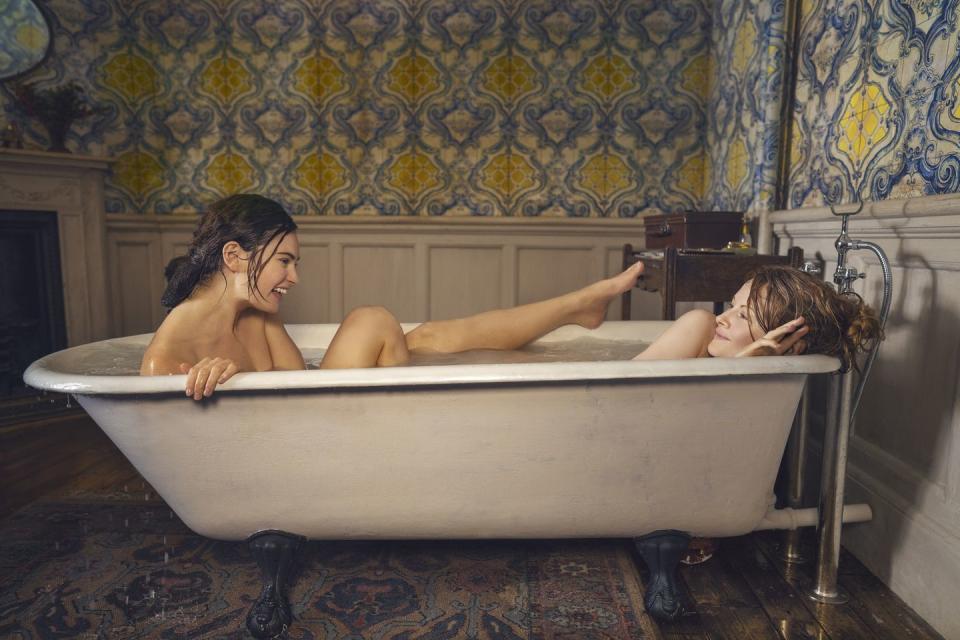
The drama also has a lot to say about the limitations of being a woman. A number of the hurdles faced by its female characters are specific to the period in which it's set – it opens in 1941, before hopping back to the 1920s. But that's not to say viewers won't recognise parallels with the current moment, even following several waves of feminism.
When Linda's 18-year-old sister becomes engaged to a 45-year-old man, her happiness isn't rooted in love, but that she's "getting out forever", leaving behind her misogynistic, xenophobic father (Dominic West) and the "fortress" that is their family home. Linda's acute desire to fall in love is inextricably bound up with her hunger for freedom and adventure.
Her yearning is a visceral reaction to the constricted environment in which she has been raised, which enables us to comprehend why Linda is the way she is. The vast halls of Alconleigh and the extensive land on which it stands do not lessen the sense of imprisonment that she feels, longing to throw on a dress and heels, and go to the cinema, and have sex. As our own lives drift back into some form of normality following the isolation we have all been forced to endure on some level over the past 12 months, it's a longing that many viewers will recognise.
A nod must also go to the supporting cast, in particular West as the pig-headed Uncle Matthew, repulsive in every regard and yet, endlessly entertaining to watch. He bullwhips the green behind the house, flips the dining table in one of his myriad wrathful outbursts, and hunts his children on horseback every Christmas, flanked by four bloodhounds, among numerous other machismo-fuelled behaviours. West is, without doubt, having a ball.
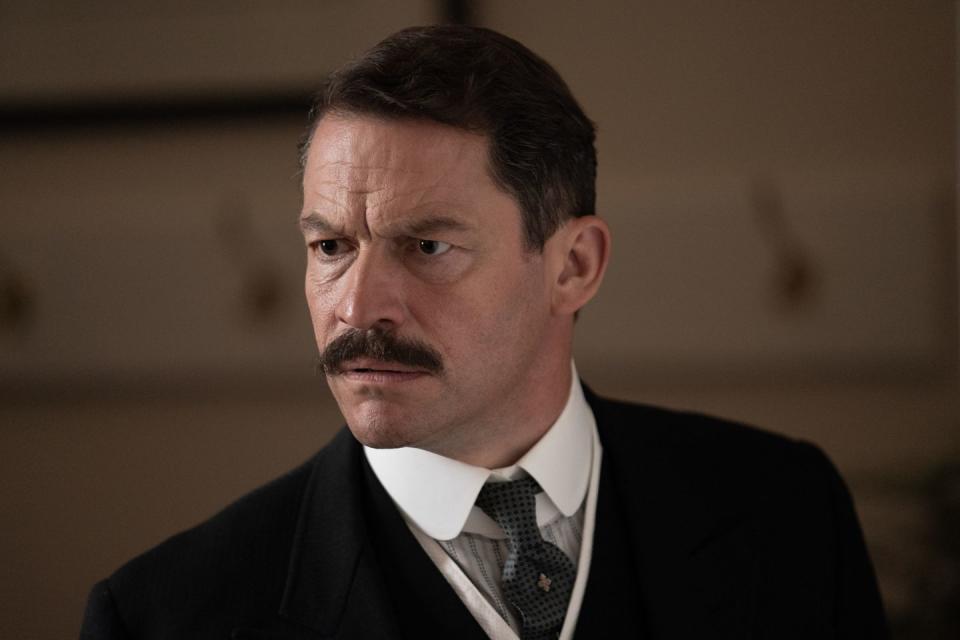
Andrew Scott is divine as "artist, musician and patron of all the young" Lord Merlin, who will be the talk of Twitter following a sumptuous, sexy, uber-camp entrance that feels like a Bob Fosse-David Bowie hybrid. He's the dandy next door, a connoisseur of culture who is rumoured to have two black whippets who wear diamond necklaces and definitely has several pigeons which he dyed cotton candy pink and electric blue, before drying them out in the linen cupboard.
Under his tutelage, Linda is exposed to art, books and conversation that her father forbids her to explore, demonising almost every aspect of the world at every turn.
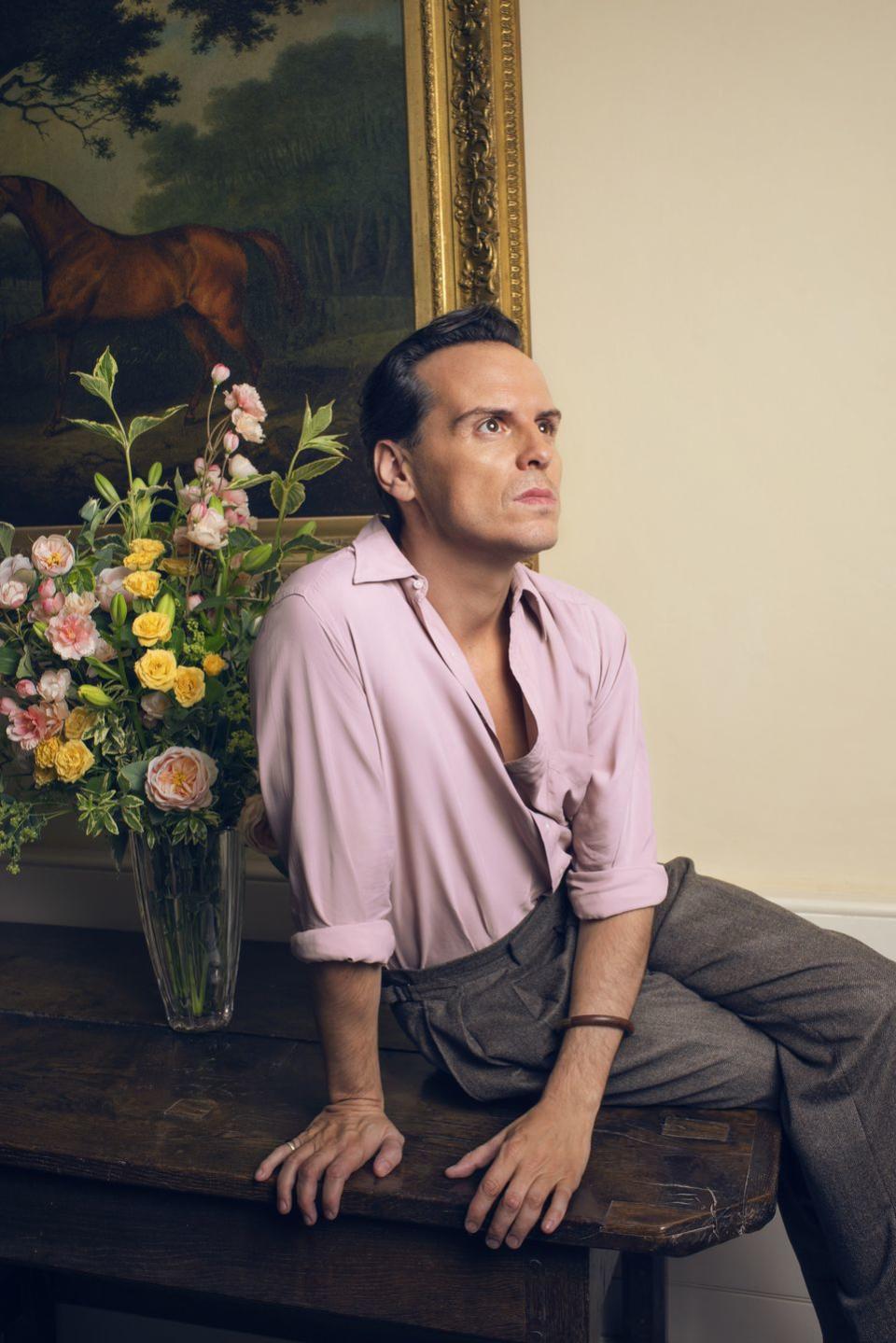
The dialogue also deserves praise, as sharp as it is tender, with plenty of humour and, despite the absurdity of so much of what unfolds, is imbued with realism, the characters made of flesh and blood. Comparisons will likely be drawn with The Favourite and The Great.
It's also a sensory feast. Mortimer effectively employs a raft of techniques – slow motion, freeze frames and a simple yet nifty introductory technique for the various movers and shakers – which gives the drama a fresh, punchy, contemporary edge, shaking off the stuffiness that can so often bog down period pieces.
That's also cemented by an innovative soundtrack which has been assembled with the utmost care and detail, boasting New Order, T-Rex and Le Tigre, to name just a handful. The music is a character in and of itself, the tone of which will be familiar to those who have watched Sofia Coppola's Marie Antoinette.
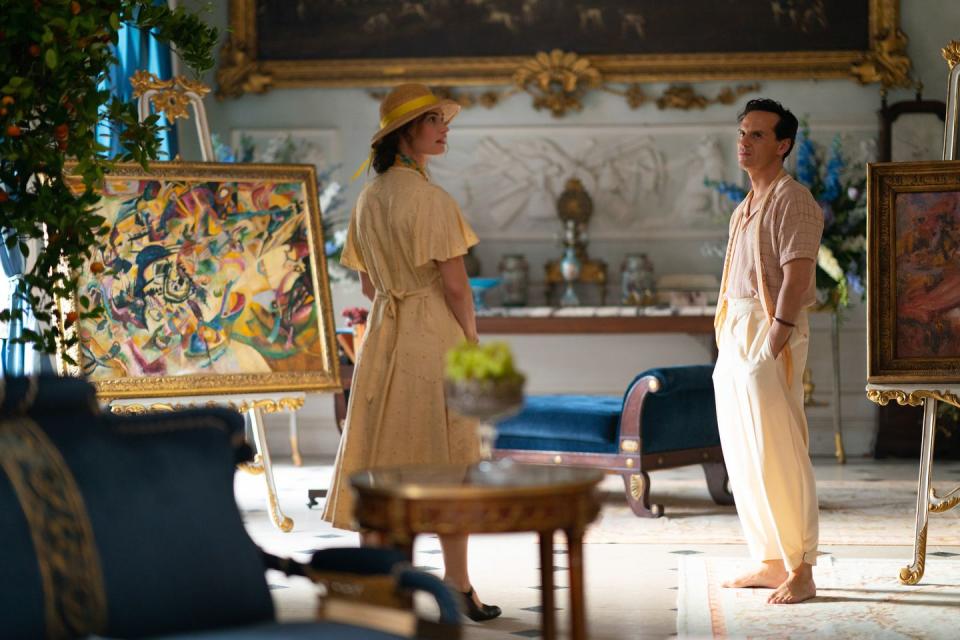
The Pursuit of Love is a romp from start to finish. From Mortimer's direction to the dazzling performances of its stars, it is an all-consuming delight that should put every debate about the value of the license fee firmly to bed.
The Pursuit of Love premiers on Sunday, May 9 at 9pm on BBC One.
Digital Spy's digital magazine is back – and we've got an EXCLUSIVE interview with Dave Bautista. Read every issue now with a 1-month free trial, only on Apple News+.
Interested in Digital Spy's weekly newsletter? Sign up to get it sent straight to your inbox – and don't forget to join our Watch This Facebook Group for daily TV recommendations and discussions with other readers.
You Might Also Like

